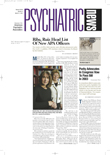Cognitive therapy and medication is superior to medication alone in bipolar patients, according to a study published in the February Archives of General Psychiatry. The combined treatment prevented relapses, alleviated symptoms, and promoted social functioning.
Researchers in the department of psychology and psychological medicine at the Institute of Psychiatry in London studied 103 patients on an outpatient basis who met DSM-IV criteria for bipolar 1 disorder. The patients were similar in age, age of onset of bipolar disorder, depression and mania rating scores, number of previous episodes of depression, mania, and hypomania, and number of hospitalizations.
However, the cognitive therapy group was slightly older and had a slightly higher number of previous episodes and hospitalizations than the control group, according to researchers. In contrast, the control group had slightly higher depression rating scores.
The majority of patients in both groups were taking mood stabilizers, about half were taking major tranquilizers, and about one-quarter were taking antidepressants.
“The purpose of this study was to recruit a large sample of patients with bipolar affective disorder who were experiencing frequent relapses despite the use of mood stabilizers. We wanted to investigate the efficacy of cognitive therapy in conjunction with common mood stabilizers such as lithium carbonate, carbamazepine, and valproate sodium in the prevention of relapses,” the authors wrote.
About half the patients received cognitive therapy and mood stabilizers, and the control group received mood stabilizers. Both groups had follow-up visits from community psychiatric nurses. During the first six months, the cognitive therapy group had a mean of three visits while the control group had a mean of eight visits. During the second six months, the cognitive therapy group had a mean of four visits and the control group had a mean of six visits, Lam told Psychiatric News.
The treatment group received 12 to 18 individual sessions of cognitive therapy during the first six months of the 12-month study and two booster sessions in the second six months.
The cognitive therapy used was designed by the researchers specifically for bipolar patients and had shown encouraging results in a previous small pilot study, they noted. The treatment consisted of the following elements in addition to traditional cognitive therapy treatment for depression:
• An emphasis on the need for combined medication and psychological therapies to help patients cope with stress.
• Cognitive-behavioral skills to monitor mood and initial signs of an episode of depression or mania and to modify behavior to prevent those initial stages from becoming full-blown episodes.
• An emphasis on sleep and daily routine to avoid sleeplessness triggering an episode.
• Identification and discussion of extreme goal-attainment attitudes driven by the patient’s perception of “lost time” due to previous illness. The resulting behaviors could disrupt patients’ sleep and daily routines, leading to more episodes.
“Cognitive therapy is well suited to teaching patients with bipolar affective disorder the relevant skills to better cope with their illness,” the authors stated.
The group receiving cognitive therapy showed a significant reduction in extreme goal-oriented attitudes at six months compared with the control group, but the improvement was not maintained at 12 months.
“Our experience in working with highly driven patients was that these attitudes were difficult to change because they were highly valued by patients,” the authors stated.
During the large one-year study, the cognitive therapy group experienced an average of nine episodes of bipolar disorder, major depression, mania, hypomania, and mixed mania and major depression compared with an average of 17 episodes for the control group.
The cognitive therapy group had an average of four hospital admissions during the 12-month study compared with an average of nine admissions for the control group for the same disorders, except for mixed episode.
Seventy-five percent of the control group patients relapsed during the first year compared with 44 percent of the cognitive therapy group.
The average number of days per episode for the group receiving cognitive therapy was significantly fewer than for the control group. In addition, the group receiving cognitive therapy showed fewer mood symptoms and less fluctuation in manic symptoms than the control group.
The limitations of the study included no measures of patients’ sleep hygiene or routine and no control for the effect of attention or medication prescribed, according to the researchers.
